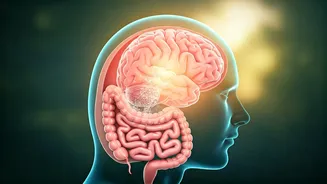Soda's Gut-Brain Connection
The intricate connection between the gut and brain is becoming increasingly understood. Often referred to as the gut-brain axis, this complex system involves
bidirectional communication. The gut microbiome, a community of microorganisms living in the digestive tract, influences this axis significantly. When individuals consume sugary drinks regularly, this can cause significant changes in the gut microbiome. The imbalance created, often marked by a decrease in beneficial bacteria and an increase in harmful ones, triggers inflammation. This inflammation isn't just limited to the gut; it can spread and affect the brain, potentially impacting mood and increasing the risk of mental health conditions such as depression. Consequently, modifying dietary habits, such as reducing the intake of sugary soft drinks, is crucial for preserving both gut health and mental well-being. A healthier gut microbiome often leads to better brain health.
Depression Risk: What's Known
Research has unveiled a correlation between regular consumption of soda and an elevated risk of depression, specifically among women. Studies indicate that those who frequently consume sugary drinks, including sodas, face an increased likelihood of experiencing depressive symptoms. While the exact mechanisms are complex, the impact on the gut-brain axis seems to be a key factor. The alteration of the gut microbiome caused by excessive sugar intake contributes to inflammation. Inflammation can impact the brain, particularly areas associated with mood regulation, contributing to a higher vulnerability to depression. Furthermore, certain substances found in sugary drinks might further disrupt neurotransmitter systems, influencing mood. This highlights the importance of dietary choices in managing and preventing mood disorders. It is prudent to consider reducing or eliminating sugary beverages from one's diet to support mental health.
Reducing Depression Risk
Taking proactive steps can help mitigate the risks associated with the consumption of sugary drinks. The initial stride involves a simple yet impactful alteration: decreasing or entirely avoiding sugary drinks. Transitioning to alternatives like water, herbal teas, or naturally flavoured beverages can make a significant difference. Furthermore, enriching the diet with whole, unprocessed foods supports a healthy gut microbiome. Foods rich in probiotics, like yogurt and fermented vegetables, can aid in restoring gut balance. Simultaneously, regular physical activity and stress management techniques, such as mindfulness or yoga, are crucial. These practices complement dietary adjustments, contributing to an overall positive impact on mental health. Remember that making sustainable lifestyle changes is paramount for lasting results. Consulting with a healthcare professional or a registered dietitian for personalized advice is highly recommended.
























